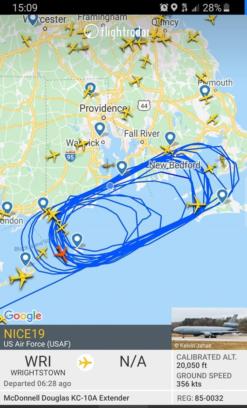
NavList:
A Community Devoted to the Preservation and Practice of Celestial Navigation and Other Methods of Traditional Wayfinding
From: Don Seltzer
Date: 2021 May 19, 20:19 -0400
Frank:As much as I love celestial navigation, please remember there's this thing called inertial navigation (ultra-high-precision gyroscopes and allies). 25 years ago it was claimed that an ICBM launched in the USA could hit a target in Russia within a mile.DC is a lot closer to Quonset than Moscow, so I'll bet the precision is even better.And there are laptop programs that have the Nautical Almanac built in and can do a sight reduction.So I suspect if GPS went down Air Force One wouldn't exactly be back to the 1800s for navigation.Lu AbelOn Wednesday, May 19, 2021, 3:16:35 PM PDT, Frank Reed <noreply_frankreed@navlist.net> wrote:Today Air Force One visited Quonset, Rhode Island. The President wasn't visiting Rhode Island --just parking the big jet here and waiting for his Uber to New London to give a commencement speech at the US Coast Guard Academy (the Uber was a USCG helicopter). Later in the day, near the time when he was expect to to fly out, I opened the FlightRadar24 app. I didn't expect AF1 to be broadcasting its position, but I wondered what else might be up flying. I tapped on an icon that indicated a relatively large aircraft, and saw an interesting flight track. It was a KC-10A tanker that spent the whole day orbiting just offshore. I suppose they keep one around in case something "bad" happens, and the President needs to stay in the air for an extended period of time. The modified 747 that normally has the call sign Air Force One is one of a very small number that is outfitted for aerial refueling. The refueling port is out on the nose right in front of the cockpit.
I started thinking about navigation contingencies, and the sort of disaster-planning that goes into the design of these presidential aircraft, and it occurred to me that AF1 almost certainly has a standard, old-fashioned periscopic sextant and manual sight-reduction tables. And I bet they practice regularly. Naturally they also have every form of electronic navigation, and I suppose they also have automated celestial systems, but in the event of a major war or disaster it seems likely that they would be ready with the traditional standby.
Frank Reed







